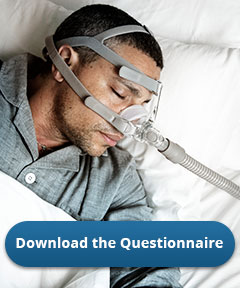About Sleep Apnea

Sleep apnea has a wide range of underwriting possibilities, as well as significant implications for a person’s health and life expectancy. Sleep apnea is defined as the temporary cessation of breathing during sleep, not to be confused with heavy snoring. When breathing stops for 10 seconds or more, it qualifies as apnea. When apneas occur, they result in the arousal of the subject, in order to stabilize the oxygen levels in the blood. The most common form of sleep apnea is obstructive sleep apnea (OSA).
Symptoms of sleep apnea often include excessive daytime sleepiness, hypertension, lung damage, heart failure, and heart rhythm irregularities. There may also be impairments to intellect, depression, and a higher risk of motor vehicle accidents.
Dangers & Diagnosis
When sleep apnea is combined with other disorders like cardiac, cerebrovascular, or pulmonary diseases, mortality risk increases. Obesity is a strong risk factor because there is excess tissue in the throat that leads to airway collapse, leading to obstruction when in the resting position. Alcohol and sedatives can aid in tissue collapse in the upper airway by further relaxing the body.
Diagnosis and severity is typically determined through an overnight polysomnography (or sleep study) that will give the results of the Apnea Index and the Apnea/Hypopnea Index, as well as the oxygen saturation.
Life Insurance Underwriting for Sleep Apnea
The key questions to ask of someone with a history of sleep apnea are:
- How long since diagnosis? Since the start of treatment?
- Does your doctor characterize it as mild, moderate, or severe?
- What were the results of your sleep study: Apnea Index, Apnea/Hypopnea Index, and Oxygen Saturation %?
- Does the condition appear to be stable, or getting better/worse?
- Any other cardiac or pulmonary issues?
Fortunately, sleep apnea patients can respond well to treatment, and the most common form of treatment is the use of a CPAP (continuous positive airway pressure) machine. A patient's ability to tolerate the device will have a big impact on its effectiveness, but those who do often have great results, including a decrease in their apnea episodes and increased oxygen saturation.
Underwriting for sleep apnea has come a long way. We have several carriers that will issue at Standard, and even a few that claim that a Preferred offer is available in the ideal situations. Please give us a call to discuss your next sleep apnea case and let us help you get the best offer possible with your client’s specific circumstances. Our free questionnaire will help you gather the necessary information.
Download the QuestionnaireAs always, we're here to help you answer questions, and provide the best underwriting services possible to help you place cases.
Click here to contact our underwriter, Mike Woods, with specific underwriting questions about sleep apnea.
